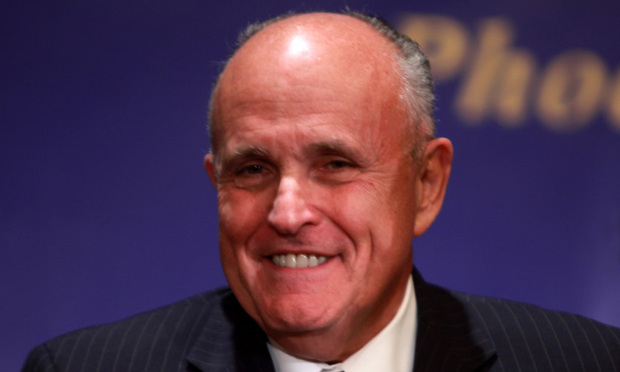How Can Rudy Giuliani Still Be Trump's Lawyer?
Isn't it just possible that Rudy Giuliani could ultimately be viewed as a co-conspirator (assuming improper or illegal acts were committed) so that ethically he cannot and should not be representing "his client"—the president of the United States.
October 04, 2019 at 01:40 PM
5 minute read
 Rudy Giuliani.
Rudy Giuliani.
No, this is not about the fact that some of Giuliani's tactics seem bizarre and destined, albeit unintentionally, to hurt the president—who, surprisingly, doesn't seem to care. And it's not about the fact that Giuliani often seems to be outright lying to the media when he purports to be representing the president and pushing his agenda.
Rather, it is apparent that, at a minimum, Giuliani is a critical witness to events involving "the call" to the Ukrainian president. Bad enough, but here is the real thing. Isn't it just possible that Giuliani could ultimately be viewed as a co-conspirator (assuming improper or illegal acts were committed) so that ethically he cannot and should not be representing "his client"—the president of the United States.
How difficult is it to imagine that, even if Trump is left alone or successfully staves off impeachment, a future prosecutor will be able to put forth a viable—indeed, indictable—claim against Giuliani? Or maybe even that, for a variety of reasons, some future prosecutor would prefer to have Giuliani (and not Trump) in his cross-hairs. Not difficult at all. And if that is the case, just how does Giuliani continue to appear, scream, posit and argue the president's position on every news show in America.
Giuliani now has a lawyer whose goal, one imagines, is largely to keep Giuliani off Congress' witness stand—he'll certainly not control Giuliani's TV persona. But wouldn't any lawyer recognize the problem in Giuliani's attempt to hide behind the obligations of privilege while at the same time trying to put the president's best foot forward?
Especially given that a lawyer with only Giuliani's interest at heart will well know that Giuliani's antics might end with the president kicking Giuliani in the shins to protect the most important person in the whole world and in his own eyes—himself? So, at the end of the day, just who does Giuliani protect—himself or DJT? Conflict city, don't you think?
Sure, Giuliani is entitled as a lawyer for a client, assuming he doesn't give false testimony to the Congress if it gets to that, to take a bullet for the president (the client) or at least try to take the weight for all that the president has done regarding Ukraine. He can—and may if push comes to shove—tell Congress, and maybe the world, that he gave Trump "advice of counsel" in an attempt to legally justify whatever it was that the president said on "the call" or preceding it. He can refuse to testify, on Fifth Amendment grounds, if subpoenaed, with the strategic hope of drawing fire away from the president.
He can deliver absolutely nutty TV performances as the president's "advocate" in order to scare the Congress away from subpoenaing him, lest he replicates the public spectacle choreographed by Corey Lewandowski. He can do all of this on behalf of his client, the president, even though he may put himself in harm's way. It's hardly unethical to "go to the wall" for a client, as long as the lawyer isn't hurting another client in the process. Indeed, he can ethically "commit political suicide," to coin a phrase, to aid the client as long as he's not obstructing justice.
However, doesn't a lawyer—albeit unconsciously—run the risk of causing harm to his client when a reflexive effort at self-protection may potentially lie just around the corner? Now, from the client's perspective, the president has other lawyers representing him alongside Giuliani, such as Jay Sekulow, who certainly can independently advise the president and ensure that he's receiving unconflicted advice.
But is that enough? Do we actually think—does President Trump actually think—that Giuliani carefully vets what comes to his mind each and every time he freewheels on television? What happens when in his "freewheeling" he somehow becomes worried about his own freedom (as opposed to that of his client)?
Consider the risk to the client when the lawyer is worried, just in the back of his head (or even unconsciously), that he himself might be charged, or at least become exposed as a potential subject of disciplinary proceedings. Could that be the reason, Giuliani publicly brought the State Department into the picture basically arguing, without saying so directly, that he was operating with the imprimatur of the Trump Administration—does that somehow help the president? Or himself?
At bottom, does Giuliani have an ethical duty to withdraw as Trump's lawyer? Maybe so. But for now at least, there will be no one to challenge his status as Trump's lawyer. The Congress won't, the courts have nothing pending before them as in litigation—if they did they might conduct a conflict hearing or a "Come To Jesus" moment urging "the client" to consider an alternative counsel. And, finally, it seems that Trump seems to like it just fine having a conflicted Rudy as his lawyer. After all, he's hardly averse to shouting "You're Fired" when he wants.
Is it possible that the disciplinary authorities in New York or Washington have received a complaint, or have opened a file about Giuliani sua sponte? Who knows? To their credit, the authorities typically conduct such inquiries confidentially, possibly without the subject of the complaint even knowing about it for a while—and even when the conduct of a presidential adviser might be implicated. Do we expect that Giuliani might step aside on his own, given that he is unambiguously a very smart lawyer and surely recognizes that a conflict exists? Not a chance!
Joel Cohen is senior counsel at Stroock, Stroock & Lavan.
This content has been archived. It is available through our partners, LexisNexis® and Bloomberg Law.
To view this content, please continue to their sites.
Not a Lexis Subscriber?
Subscribe Now
Not a Bloomberg Law Subscriber?
Subscribe Now
NOT FOR REPRINT
© 2025 ALM Global, LLC, All Rights Reserved. Request academic re-use from www.copyright.com. All other uses, submit a request to [email protected]. For more information visit Asset & Logo Licensing.
You Might Like
View All
‘Catholic Charities v. Wisconsin Labor and Industry Review Commission’: Another Consequence of 'Hobby Lobby'?
8 minute read
AI and Social Media Fakes: Are You Protecting Your Brand?

Neighboring States Have Either Passed or Proposed Climate Superfund Laws—Is Pennsylvania Next?
7 minute read
Trending Stories
Who Got The Work
J. Brugh Lower of Gibbons has entered an appearance for industrial equipment supplier Devco Corporation in a pending trademark infringement lawsuit. The suit, accusing the defendant of selling knock-off Graco products, was filed Dec. 18 in New Jersey District Court by Rivkin Radler on behalf of Graco Inc. and Graco Minnesota. The case, assigned to U.S. District Judge Zahid N. Quraishi, is 3:24-cv-11294, Graco Inc. et al v. Devco Corporation.
Who Got The Work
Rebecca Maller-Stein and Kent A. Yalowitz of Arnold & Porter Kaye Scholer have entered their appearances for Hanaco Venture Capital and its executives, Lior Prosor and David Frankel, in a pending securities lawsuit. The action, filed on Dec. 24 in New York Southern District Court by Zell, Aron & Co. on behalf of Goldeneye Advisors, accuses the defendants of negligently and fraudulently managing the plaintiff's $1 million investment. The case, assigned to U.S. District Judge Vernon S. Broderick, is 1:24-cv-09918, Goldeneye Advisors, LLC v. Hanaco Venture Capital, Ltd. et al.
Who Got The Work
Attorneys from A&O Shearman has stepped in as defense counsel for Toronto-Dominion Bank and other defendants in a pending securities class action. The suit, filed Dec. 11 in New York Southern District Court by Bleichmar Fonti & Auld, accuses the defendants of concealing the bank's 'pervasive' deficiencies in regards to its compliance with the Bank Secrecy Act and the quality of its anti-money laundering controls. The case, assigned to U.S. District Judge Arun Subramanian, is 1:24-cv-09445, Gonzalez v. The Toronto-Dominion Bank et al.
Who Got The Work
Crown Castle International, a Pennsylvania company providing shared communications infrastructure, has turned to Luke D. Wolf of Gordon Rees Scully Mansukhani to fend off a pending breach-of-contract lawsuit. The court action, filed Nov. 25 in Michigan Eastern District Court by Hooper Hathaway PC on behalf of The Town Residences LLC, accuses Crown Castle of failing to transfer approximately $30,000 in utility payments from T-Mobile in breach of a roof-top lease and assignment agreement. The case, assigned to U.S. District Judge Susan K. Declercq, is 2:24-cv-13131, The Town Residences LLC v. T-Mobile US, Inc. et al.
Who Got The Work
Wilfred P. Coronato and Daniel M. Schwartz of McCarter & English have stepped in as defense counsel to Electrolux Home Products Inc. in a pending product liability lawsuit. The court action, filed Nov. 26 in New York Eastern District Court by Poulos Lopiccolo PC and Nagel Rice LLP on behalf of David Stern, alleges that the defendant's refrigerators’ drawers and shelving repeatedly break and fall apart within months after purchase. The case, assigned to U.S. District Judge Joan M. Azrack, is 2:24-cv-08204, Stern v. Electrolux Home Products, Inc.
Featured Firms
Law Offices of Gary Martin Hays & Associates, P.C.
(470) 294-1674
Law Offices of Mark E. Salomone
(857) 444-6468
Smith & Hassler
(713) 739-1250






